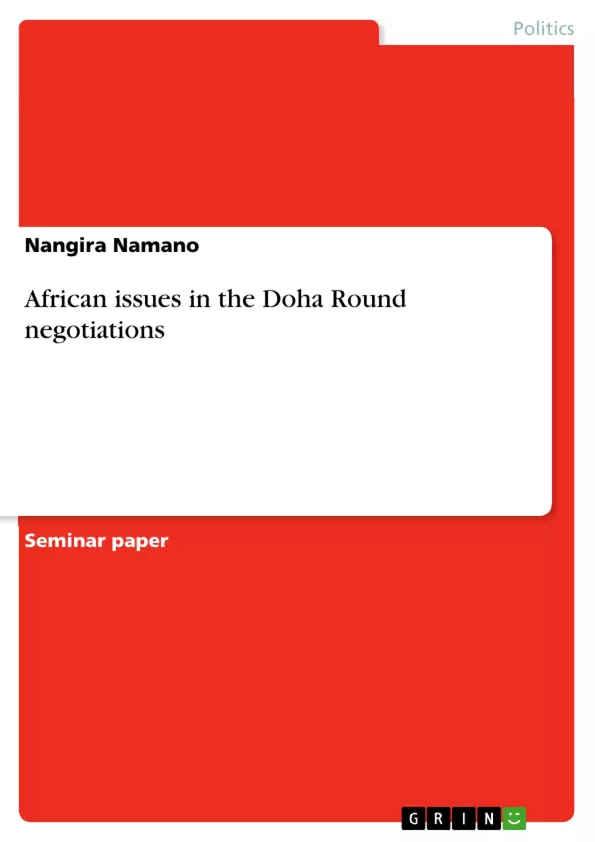The Doha Round is the most recent round of trade negotiations amongst the 157 WTO members since the 1940s, commenced 2001. This is the first ever round since the adoption of the multilateral approach to trade system. Its envisioned objective is attain reforms in the international trading system by ensuring low trade barriers introduction and trade rules revision and/or writing.
The adopted Doha Round is semi officially known as the Doha Development Agenda (DDA) work programme containing approximately 20 trade areas that are deemed to achieve the set objectives. During these talks, different states either from the core or the periphery have different interests and thus seek to have them addressed in the most viable resolutions.
Inhaltsverzeichnis (Table of Contents)
- Introduction
- Guiding values
- The Doha Round issues
- Agriculture
- LDCs and NFICDs Special Concerns.
- Non-agricultural market access.
- Domestic support issue.......
- Services
- Intellectual Property
- Trade and Development
- Trade and Environment..
- WTO Rules...
- Accesses to patented medicine.
- Achievements
- Conclusion
Zielsetzung und Themenschwerpunkte (Objectives and Key Themes)
This paper examines the main concerns raised by African states during the Doha Round of trade negotiations, with a focus on the agricultural sector and its significance for African economies. It analyzes the impact of the proposed trade reforms on African countries' economic development and explores the challenges they face in navigating the global trade system.
- Impact of the Doha Round on African agriculture
- Trade barriers and market access for agricultural products
- Domestic support and subsidies for agricultural production
- The role of the WTO in shaping global trade policies
- The challenges of development and food security in Africa
Zusammenfassung der Kapitel (Chapter Summaries)
The paper begins by introducing the Doha Round as the most recent round of trade negotiations within the WTO framework, aiming to reform the international trading system. It highlights the guiding principles of the round, focusing on consensus-building and the need to address the interests of developing countries, particularly the Least Developed Countries (LDCs).
Chapter 2 delves into the specific issues raised within the Doha Round, with a particular focus on agriculture. The chapter emphasizes the significant reliance of most African countries on agriculture as a source of GDP and the concerns surrounding the potential impact of the round's agreements on this sector. The chapter further explores the concerns regarding developed countries' expectations for developing countries to reduce tariffs and the need for increased market access for agricultural goods.
Schlüsselwörter (Keywords)
The key themes and concepts explored in the paper include African agriculture, Doha Round negotiations, market access, subsidies, trade barriers, developing countries, food security, and the role of the WTO in shaping international trade policy.
Frequently Asked Questions
What is the Doha Round of WTO negotiations?
The Doha Round, also known as the Doha Development Agenda (DDA), is a major trade negotiation round aimed at reforming the international trading system and lowering trade barriers.
Why is agriculture so important for African countries in the Doha Round?
Agriculture is a significant contributor to the GDP of most African nations. Reforms in this sector directly impact their food security and economic development.
What are the main concerns regarding domestic support and subsidies?
African states argue that high subsidies in developed countries create unfair competition, making it difficult for African farmers to compete in the global market.
What does "Non-Agricultural Market Access" (NAMA) refer to?
NAMA refers to negotiations on trade barriers for products not covered by the Agreement on Agriculture, such as manufactured goods and natural resources.
How do Intellectual Property (IP) rules affect African nations?
A key issue is access to patented medicines. African nations seek flexibility in IP rules to ensure affordable healthcare for their populations.
- Quote paper
- BSc. BIT MA (ICM) Nangira Namano (Author), 2017, African issues in the Doha Round negotiations, Munich, GRIN Verlag, https://www.grin.com/document/423481



